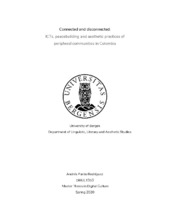| dc.contributor.author | Pardo Rodríguez, Andrés | |
| dc.date.accessioned | 2020-06-27T04:27:57Z | |
| dc.date.available | 2020-06-27T04:27:57Z | |
| dc.date.issued | 2020-06-27 | |
| dc.date.submitted | 2020-06-26T22:00:26Z | |
| dc.identifier.uri | https://hdl.handle.net/1956/23080 | |
| dc.description.abstract | This thesis analyzes how Information and Communications Technologies (ICTs) have been introduced in rural regions of Colombia for peacebuilding purposes and strengthening democracy, and how these have had an impact on the aesthetic practices of local communities. This research discusses theories about the relationship between technology and society, and it provides a critical perspective from the idea that technology solves social problems. Case studies of ICTs projects from the Soviet Union, Estonia, France, Finland, Chile and Paraguay are introduced and examined, to give an account of how similar processes took place in different contexts. Two case studies from Colombia are analyzed (Vive Digital and Linternet), and suggestions that can improve future projects are shared. | en_US |
| dc.language.iso | eng | |
| dc.publisher | The University of Bergen | |
| dc.rights | Copyright the Author. All rights reserved | |
| dc.subject | Digital Culture | |
| dc.subject | technological determinism | |
| dc.subject | ICT4D | |
| dc.subject | progress | |
| dc.subject | ICTs | |
| dc.subject | Peacebuilding | |
| dc.subject | technoscience | |
| dc.subject | aesthetic practices | |
| dc.title | Connected and disconnected: ICTs, peacebuilding and aesthetic practices of peripheral communities in Colombia | |
| dc.type | Master thesis | |
| dc.date.updated | 2020-06-26T22:00:26Z | |
| dc.rights.holder | Copyright the Author. All rights reserved | |
| dc.description.degree | Master's Thesis in Digital Culture | |
| dc.description.localcode | MAHF-DIKUL | |
| dc.description.localcode | DIKULT350 | |
| dc.subject.nus | 719906 | |
| fs.subjectcode | DIKULT350 | |
| fs.unitcode | 11-21-0 | |
